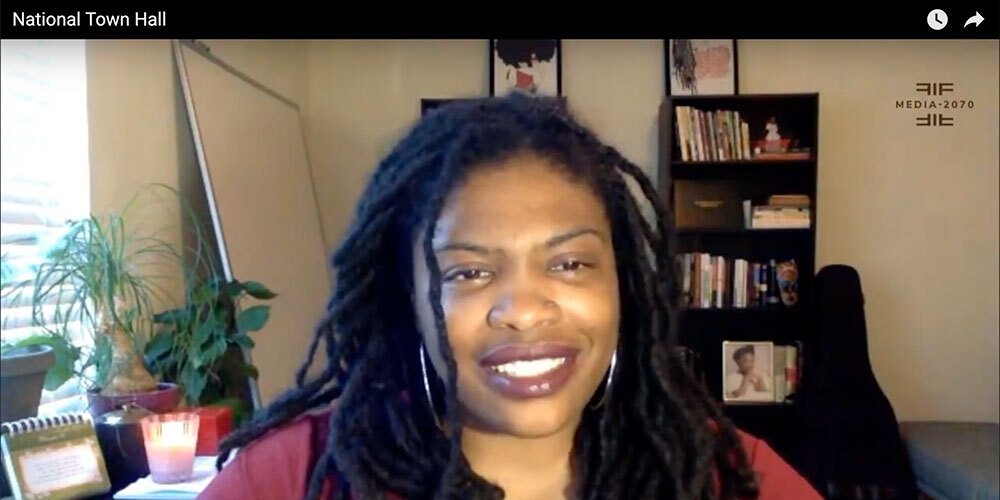A View from the Field: Fighting for Black Communities
April 3, 2023
Blog

Media 2070 Campaign Manager Venneikia Williams spoke during a national town hall the team held on ways to combat anti-Blackness in newsrooms.
A View from the Field is an ongoing feature that highlights the efforts of Free Press’ team of organizers and advocates.
Once a month, we provide updates from the field as staffers work alongside our amazing allies and activists to create a more just and equitable media system.
- Earlier this year, Elizabeth Green of Chalkbeat, Darryl Holliday of City Bureau and Mike Rispoli of Free Press released The Roadmap for Local News, which offers a prescription for addressing the crisis in journalism that has wreaked havoc on local news over the past 20 years. In March, Mike led a briefing on the roadmap for 100 members of the Free Press-led Media Power Collaborative. This collective of media workers, movement organizers and allied researchers is working to win policies that will give people the news and information they need to thrive.
- Mike also discussed the roadmap with a class Professor Victor Pickard teaches at the University of Pennsylvania’s Annenberg School for Communication (Pickard is also the chair of the Free Press/Free Press Action boards).
- Vice President of Policy and General Counsel Matt Wood took part in “Making Sense of Section 230: A Deep Dive Into Recent Legal Battles,” a panel discussion held at the State of the Net conference. In December, Free Press Action filed a brief at the Supreme Court in a case that could fundamentally change how the internet works by invalidating Section 230. “Section 230 encourages the open exchange of ideas and takedowns of hateful and harmful material,” Matt said back in December. “Losing the core of Section 230 could risk chilling online expression, which would disproportionately harm Black and Brown communities, LGBTQIA+ people, immigrants, religious minorities, dissidents, and all people and ideas targeted for suppression or harassment by powerful forces.”
- Free Press Action teamed up with allies in the Disinfo Defense League to host a Capitol Hill briefing on the harms that privacy violations, digital redlining, hate speech and disinformation pose for communities of color and others who experience online discrimination. Co-CEO Jessica J. González moderated the briefing, which featured remarks from Sen. Ben Ray Luján, Rep. Yvette Clarke and advocates from Common Cause, the Filipino Young Leaders Program, New Georgia Project Action Fund and United We Dream Action. The stakes are high: As Jessica noted, malicious online forces are working to “undermine democracy, peaceful transitions of power [and] the right to vote.” Check out Campaign Manager Rose Lang-Maso’s blog post for more info on the briefing, including videos of the speakers.
- Jessica also took part in the panel discussion “Is Social Media Helping or Harming Democracy?” at the University of California’s annual #SpeechMatters conference. The event examined ways in which college campuses nationwide can protect people’s fundamental rights in a time when democracy is under threat.
- Reparative Journalism Program Manager Diamond Hardiman, Media 2070 Campaign Manager Venneikia Williams and Senior Advisor of Reparative Policy and Programs Joseph Torres presented at CUNY’s Black Media Futures, a virtual conference that explored the current state and future prospects of Black media. Joe took part in the panel discussion “Black Media Past” and Diamond hosted a “Black Future Headlines” workshop. Venneikia spoke about how Media 2070 envisions a future that centers care for Black journalists and communities.
- Venneikia also discussed the need for care during an OpenNews Community Call.“There’s such distrust, not just in Black communities but especially in our communities when it comes to how we are portrayed,” she said during the panel discussion. “ … We say harm has been inflicted and there needs to be a treatment plan. The antidote to harm is care. Not just care, but repair and accountability.”
- Venneikia and News Voices: Philadelphia Project Manager Tauhid Chappell participated in a lightning Zoom chat that Gather hosted on how to build the infrastructure needed for equitable journalism. The conversation explored models for “accountability infrastructure” — systems, structures or programs that ensure that entities with power (news organizations, editors, CEOs) address the needs and concerns of those with less (e.g., BIPOC journalists and community members). Venneikia and Tauhid discussed Media 2070’s “Pledge to Care for Black Communities and Journalists” campaign as well as Free Press’ work with the Journalism Accountability Watchdog Network to hold Philadelphia newsrooms accountable.
- The Media 2070 team held a national town hall to collaborate with participants on ways to combat anti-Blackness in newsrooms and create a media system that no longer harms Black lives. The town hall also marked the conclusion of Media 2070’s tour of its award-winning documentary Black in the Newsroom, which Vice President of Cultural Strategy Collette Watson directed. Collette, who’s also the Media 2070 director, spoke during the town hall, as did Diamond and Venneikia. Attendees included professors, journalists and community members who hosted screenings of Black in the Newsroom, participated in panels and expressed interest in Media 2070’s work. Collette shared never-before-seen footage from the film, which chronicles journalist Elizabeth Montgomery’s experience with systemic racism. Communications consultant Tianna Mañón interviewed Elizabeth, who offered powerful words about her journey toward healing.